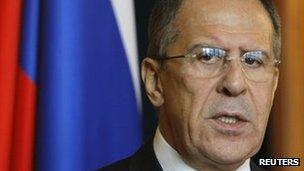Russia aims to keep Syria options open after UN veto
- Published
- comments

Sergei Lavrov will visit Damascus on Tuesday for talks with President Assad
For Western countries, their policy in Libya was defined in large part by how it differed from what they did in Iraq.
For Russia and China however, the similarities, particularly the outcome of regime change, were the more striking point, one that now leads them to thwart US or British designs in Syria.
Russia's Foreign Minister Sergei Lavrov has argued that the draft UN resolution vetoed by his country and China at the weekend was designed to pave the way for a "Libyan scenario". Chinese officials too have drawn parallels.
Key phrases in the proposed resolution called upon President Bashar al-Assad of Syria to stand down while a national unity government was formed prior to elections. Mr Lavrov argued that this ran counter to the UN Charter's provisions on non-interference in the internal affairs of other countries.
For some in the Kremlin and Beijing, the West has pursued a long term policy of disposing of its bogeymen in the Arab world. With Saddam Hussein, Muammar Gaddafi, and the Assad clan, they suggest, the tactics may have been different, but the desired result has been the same.
And the tendency of British or French leaders to trumpet their achievement in getting the Arab League to sign up to military action in Libya has simply hardened views in Moscow and Beijing.
These countries argue they were hoodwinked into allowing the Libya resolution to pass on the basis of protecting the civilian population and do not wish to make the same mistake again.
After the draft resolution on Syria was tabled last week, Hillary Clinton, the US Secretary of State, tried to anticipate these arguments, heading them off by pointing out that it did not anticipate foreign military intervention and that the choice of a new government was entirely a matter for the Syrian people.
Once Russia and China used their vetoes, some decidedly undiplomatic outbursts followed.
The refusal of two permanent members of the UN Security Council to go along with the draft was described by Britain's Foreign Secretary William Hague as "a betrayal of the Syrian people".
The US ambassador to the UN, Susan Rice, argued, "a couple members of this council remain steadfast in their willingness to sell out the Syrian people and shield a craven tyrant".
For their own ideological reasons, Russia and China will not sign up to anything that resembles Pax Americana in the Middle East. But can the price, in terms of anger provoked across the Arab world and appearing as the defenders of despots be worth it?
Mr Lavrov's decision to travel to Damascus on Tuesday seems designed in part to convince people that Russia is keen to search for alternative solutions to the crisis, rather than simply exerting a negative influence.
Russian diplomats have suggested that they vetoed the UN resolution in part because its sponsors moved it to the vote too quickly. However since the Syrian opposition appears determined to boycott Russian attempts to mediate some sort of power sharing deal it would appear that Mr Lavrov could make any number of trips to Syria without it making a decisive difference.
Given that neither Russia nor China can guarantee the survival of the Assad regime, both countries have to be careful to preserve their options for the future, so they are trying to maintain some kind of relationship with opposition groups, despite anger at the veto.
Their actions at the UN owe more to great power rivalry than anything else - and remind us that in a "multi-polar world", thwarting the designs of one group of countries (ie the US, UK, and France) may in itself be reason enough for the actions of others.